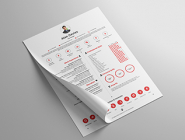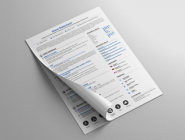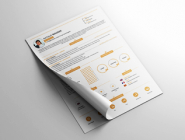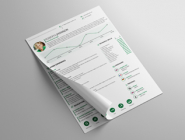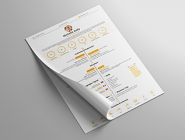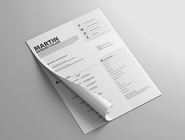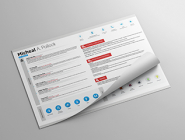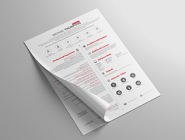
In order to get your foot in the door, so to speak, and secure that interview for that dream job; you need more than just your wit and charm. You need some of document that gives your potential employer a good overview of what you have done in your academic professional and vocational career to that date. The most commonly used documents for this purpose is the CV and resume.
When you have applied for employment in the past you may have looked at the dilemma of CV v resume and been undecided which is best. Many use both terms as if they were on and the same thing and completely interchangeable, when the truth is they are not.
Though there are definitely similarities between these two types of document; there are some very important differences it is imperative you understand before deciding which to use.
Before we look in greater detail at the differences, it is a good idea that you understand exactly what each of these documents entails and includes. get into more detailed as to the differences, we will look first at what each of these documents are and what they include. We will then look at where each document is used where in the world.
Curriculum Vitae (CV)
A Curriculum Vitae (a Latin term which fittingly means course of life) is a very thorough and in-depth document that can be anything from a couple of pages and more. It is much more than just a brief biography of your career to date, it is essentially a very detailed breakdown of your achievements.
As well as your work history, it presents your education, from high school through to college/university and any other courses you may have participated in over the years. Along with these details, it also features any other accomplishments you have to your name such as honours, awards, publications etc.
When compared to a resume, as you will see in the next section, a Curriculum Vitae is designed to give potential employers a clear and chronological overview of your full education, vocational and working career to date. While it is best practice with resumes to change or alter them to highlight different achievements depending on the role you are applying for, a CV stays the same. The accompanying cover letter is the part that should be tweaked to highlight why you feel you are a good match for a particular role with a particular company.
Resume
A more concise document, a resume is usually no longer than one page and is put together with the view to being easily digested and not dwelt upon to much by a prospective employer. The main goal of a resume is to make you and your experience stand out ahead of your competition, so that your potential employer sees you as the right candidate for the job.
Unlike a CV, a resume can and should be adapted to best match each position you apply for. It is in your best interest to alter it, to highlight specifics of your experience that are more pertinent to a particular position. Additionally, another point worth making note of is the fact a resume does not need to be in chronological order or include a full account of your career.
CV V Resume: The Differences
As noted above, there are three crucial differences to note, when discussing CV v resume for job seeking. These differences are:
- The length
- The purpose
- The layout
While a CV is a comprehensive overview of your education, work experience, skills and qualifications on anything from 2 pages or more; a resume is a short and concise summary of specific skills and experience applicable to a particular role or position. Any changes or specific details you want to highlight when sending a CV should be included in the cover letter.
CV V Resume: Who Uses What Where?
One of the factors, along with the above, that may influence your decision to use either a CV or a resume when applying for work, is where the job is located. In the US and Canada for instance, the preferred document to accompany a job application is a resume. Interestingly, Canadians and Americans would only ever use a CV if they were looking for a research or academic-centred position or were searching for work overseas.
In complete contrast, Curriculum Vitae is the document job seekers use in NZ, UK and Ireland, as resumes are not used at all. It is a similar case in mainland Europe and other connected islands and there is a downloadable standard EU CV format available.
German job seekers have a very unique experience. While they use a similar CV format (Lebenslauf) to the rest of Europe, UK, Ireland and NZ; they also have a vast array of documents they must provide in order to get job interviews.
At the outset of this post as you may recall, we spoke of how people often consider and there to be no difference when it comes to a CV v resume. In South Africa and Australia though, they are considered the same thing.
In those countries when trying to decide which is best with regard to CV v Resume, it depends on the type of work you want. If you are trying to get work in the public sector, you would use and refer to it as a CV; while on the other hand, if you are looking for private sector employment, you would refer to it as a resume.
Why You Should Create A CV Anyway
Even if you do not need a CV when applying for work at the moment, it is a good idea to put one together anyway. There is no need to panic and drop everything to work on it, though having a CV will fulfil a dual purpose.
As well as having a one at your disposal should you need it, you will also have a comprehensive “master” list of everything you have every accomplished. You can then use this list to cherry pick the skills and experience you want to highlight on your resume for particular sectors, jobs and positions.
CV V Resume: Conclusion
When you look at the argument of CV v resume, the choice of which is the right document for you is a lot simpler than you may have initially thought. There are crucial differences between the two formats, in terms of length, purpose and layout. As this post has hopefully shown you, first and foremost, the most important factor in choosing whether to use a CV or a resume is where positions you want to apply for are located.
If you are intending on working overseas in the Americas and Canada, you will be more than likely using a simple, condensed resume. While if you are looking for work in either UK, Ireland or mainland Europe - you will need to use a CV.

